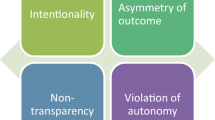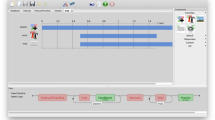Abstract
This article analyzes three approaches to resolving the classical Meno paradox, or its variant, the learning paradox, emphasizing Charles S. Peirce’s notion of abduction. Abduction provides a way of dissecting those processes where something new, or conceptually more complex than before, is discovered or learned. In its basic form, abduction is a “weak” form of inference, i.e., it gives only tentative suggestions for further investigation. But it is not too weak if various sources of clues and restrictions on the abductive search are taken into account. We present three, complementary versions of abduction: (1) as a sort of guessing instinct or expert-like intuition, where unconscious clues are important; (2) as a form of inference, where a strategic point of view is essential; and (3) as a part of distributed cognition and mediated activity, where the interaction with the material, social, and cultural environment is emphasized. Our starting point is Peirce’s own notion of abduction, but we broaden the perspective, especially to the direction of distributed cognition.
Similar content being viewed by others
References
Achinstein, P. (1970). Inference to scientific laws. In R.H. Stuwer (ed). Minnesota Studies in the Philosophy of Science, 5: 87–111
C. Bereiter (1985) ArticleTitleTowards a solution of the learning paradox Review of Educational Research 55 IssueID2 201–226
C. Bereiter (2002) Education and mind in the knowledge age Erlbaum Hillsdale, NJ
C. Bereiter M. Scardamalia (1993) Surpassing ourselves. An inquiry into the nature and implications of expertise Open Court Chicago
M. Cole Y. Engeström (1993) A cultural–historical approach to distributed cognition G. Salomon (Eds) Distributed cognitions: Psychological and educational considerations Cambridge University Press Cambridge 1–46
CP (volume.paragraph, year) – see: Peirce, C. S. (1931–1958)
D.J. Cunningham (1998) ArticleTitleCognition as semiosis: The role of inference Theory and Psychology 8 827–840
G. Cziko (1995) Without miracles. Universal selection theory and the second Darwinian Revolution A Bradford Book, The MIT Press Cambridge, MA
M. Donald (1981) The origins of the modern mind Harvard University Press Cambridge, MA
H. Dreyfus S. Dreyfus (1986) Mind over machine: The power of human intuition and expertise in the era of the computer Basil Blackwell Oxford
U. Eco T.A. Sebeok (1988) The sign of three. Dupin, Holmes, Peirce Indiana University Press Bloomington
Y. Engeström (1987) Learning by expanding Orienta-Konsultit Helsinki
Y. Engeström R. Miettinen R.-L. Punamäki (1999) Perspectives on activity theory Cambridge University Press Cambridge, MA
P.J. Feltovich R.J. Spiro R.L. Coulson (1997) Issues of expert flexibility in contexts characterized by complexity and change P.J. Feltovich K.M. Ford R.R. Hoffman (Eds) Expertise in context AAAI Press Menlo Park, CA 125–146
L. Fleck (1935) Genesis and development of a scientific fact The University of Chicago Press Chicago
E. Gruber Howard (1981) ArticleTitleOn the relation between ‘aha experiences’ and the construction of ideas History of Science 19 41–59
K. Hakkarainen T. Palonen S. Paavola E. Lehtinen (2004) Communities of networked expertise: Professional and educational perspectives Elsevier Amsterdam
K. Hakkarainen M. Sintonen (2002) ArticleTitleInterrogative approach on inquiry and computer-supported collaborative learning Science and Education 11 IssueID1 25–43 Occurrence Handle10.1023/A:1013076706416
N.R. Hanson (1958) Patterns of discovery University Press Cambridge
Hanson N.R. (1961). Is there a logic of scientific discovery. In: Feigl H., Maxwell G. (eds.). Current issues in the philosophy of science. Holt Rinehart and Winston Inc., New York
G. Harman (1965) ArticleTitleInference to the best explanation Philosophical Review 74 88–95
G. Harman (1986) Change in view MIT Press Cambridge, MA
R.M. Hogarth (2001) Educating intuition The University of Chicago Press Chicago
E. Hutchins (1995) Cognition in the wild MIT Cambridge, MA
T.S. Kuhn (1970) The structure of scientific revolutions EditionNumber2nd enlarged ed., University of Chicago Press Chicago
P. Lipton (2004) Inference to the best explanation EditionNumber2nd ed. Routledge London
C.J.B. Macmillan J.W. Garrison (1988) A logical theory of teaching. Erotetics and intentionality Kluwer Academic Publishers Dordrecht
L. Magnani (2001) Abduction, reason, and science. Processes of discovery and explanation Kluwer Academic/Plenum Publishers New York
McGrenere, J. and Ho, W. (2000). Affordances: Clarifying and evolving a concept. Proceedings of Graphics Interface 2000, 179–186. Available: http://www.cs.ubc.ca/ joanna/# Publications
P. Mullins (2002) ArticleTitlePeirce’s abduction and Polanyi’s tacit knowing The Journal of Speculative Philosophy 16 IssueID3 198–224
D. Nesher (2001) ArticleTitlePeircean epistemology of learning and the function of abduction as the logic of discovery Transactions of the Charles S. Peirce Society 37 IssueID1 23–57
T. Nickles (1981) ArticleTitleWhat is a problem that we may solve it? Synthese 47 85–118 Occurrence Handle10.1007/BF01064267
I. Niiniluoto (1999) ArticleTitleDefending abduction Philosophy of Science 66 S436–S451 Occurrence Handle10.1086/392744
S. Paavola (2004a) ArticleTitleAbduction through grammar, critic and methodeutic Transactions of the Charles S. Peirce Society 40 IssueID2 245–270
S. Paavola (2004b) ArticleTitleAbduction as a logic of discovery: The importance of strategies Foundations of Science 9 IssueID3 267–283 Occurrence Handle10.1023/B:FODA.0000042843.48932.25
S. Paavola (2005) ArticleTitlePeircean abduction: Instinct, or inference? Semiotica 153-1/4 131–154
R.D. Pea (1993) Practices of distributed intelligence and designs for education G. Salomon (Eds) Distributed cognitions: Psychological and educational considerations Cambridge University Press Cambridge 47–87
Peirce, C. S. (1931–1958) [CP (volume.paragraph, year)]. Collected Papers of Charles Sanders Peirce, vol 1–6, C. Hartshorne and P. Weiss (eds), vol 7–8, A. W. Burks (ed). Cambridge, Mass.: Harvard University Press
Peirce C.S. (1985). Historical perspectives on Peirces logic of science. A history of science, 2 Vols. In C. Eisele (ed). Mouton Publishers, Berlin
C.S. Peirce (1929) ArticleTitleGuessing Hound & Horn 2 IssueID3 267–282
M. Piattelli-Palmarini (Eds) (1980) Language and learning. The debate between Jean Piaget and Noam Chomsky Harvard University Press Cambridge, MA
Polanyi, M. (1966). The Tacit Dimension. Gloucester, MA: Peter Smith, reprinted 1983
K. Popper (1972) Objective knowledge: An evolutionary approach Oxford University Press Oxford
R.S. Prawat (1999) ArticleTitleDewey, Peirce, and the learning paradox American Educational Research Journal 36 IssueID1 47–76
Ransdell J. (2003). The relevance of Peircean semiotic to computational intelligence augmentation. S.E.E.D. Journal (Semiotics, Evolution, Energy, and Development), 3(3), 5–36. Available: http://www.library.utoronto.ca/see/SEED/Vol3–3/Ransdell.htm
Rumelhart, D. E. and McClelland, J. L. and the PDP Research Group. (1986). Parallel Distributed Processing. Exploration in the microstructure of cognition. Volume 1: Foundations. Cambridge, MA: MIT Press
G. Salomon (1993) Distributed cognitions: Psychological and educational considerations Cambridge University Press Cambridge
I. Semetsky (2005) ArticleTitlePeirce’s semiotics, subdoxastic aboutness, and the paradox of inquiry Educational Philosophy and Theory 37 IssueID2 227–238 Occurrence Handle10.1111/j.1469-5812.2005.00111.x
I. Semmelweis (1983) The etiology, concept, and prophylaxis of Childbed Fever. Translated by K. Codell Carter The University of Wisconsin Press Wisconsin
Timothy Shanahan (1986) ArticleTitleThe first moment of scientific inquiry: C. S. Peirce on the logic of abduction Transactions of the Charles S. Peirce Society 22 IssueID4 450–466
P. Skagestad (1993) ArticleTitleThinking with machines: Intelligence augmentation, evolutionary epistemology, and semiotic The Journal of Social and Evolutionary Systems 16 IssueID2 157–180 Occurrence Handle10.1016/1061-7361(93)90026-N
P. Thagard (1988) Computational philosophy of science MIT Press Cambridge, MA
Paul Thagard (2000) Coherence in thought and action A Bradford Book, MIT Press Cambridge, Massachusetts
P. Thagard C. Shelley (1997) Abductive reasoning: Logic, visual thinking, and coherence M.L. Dalla Chiara K. Doets D. Mundici J. Bentham Particlevan (Eds) Logic and scientific methods Kluwer Dordrecht 413–427
L.S. Vygotsky (1978) Mind in society. The development of higher psychological processes Harvard University Press Cambridge, Massachusetts
M. Wartofsky (1979) Models, representation, and the scientific understanding Reidel Boston
Author information
Authors and Affiliations
Corresponding author
Rights and permissions
About this article
Cite this article
Paavola, S., Hakkarainen, K. Three Abductive Solutions to the Meno Paradox – with Instinct, Inference, and Distributed Cognition. Stud Philos Educ 24, 235–253 (2005). https://doi.org/10.1007/s11217-005-3846-z
Received:
Issue Date:
DOI: https://doi.org/10.1007/s11217-005-3846-z




